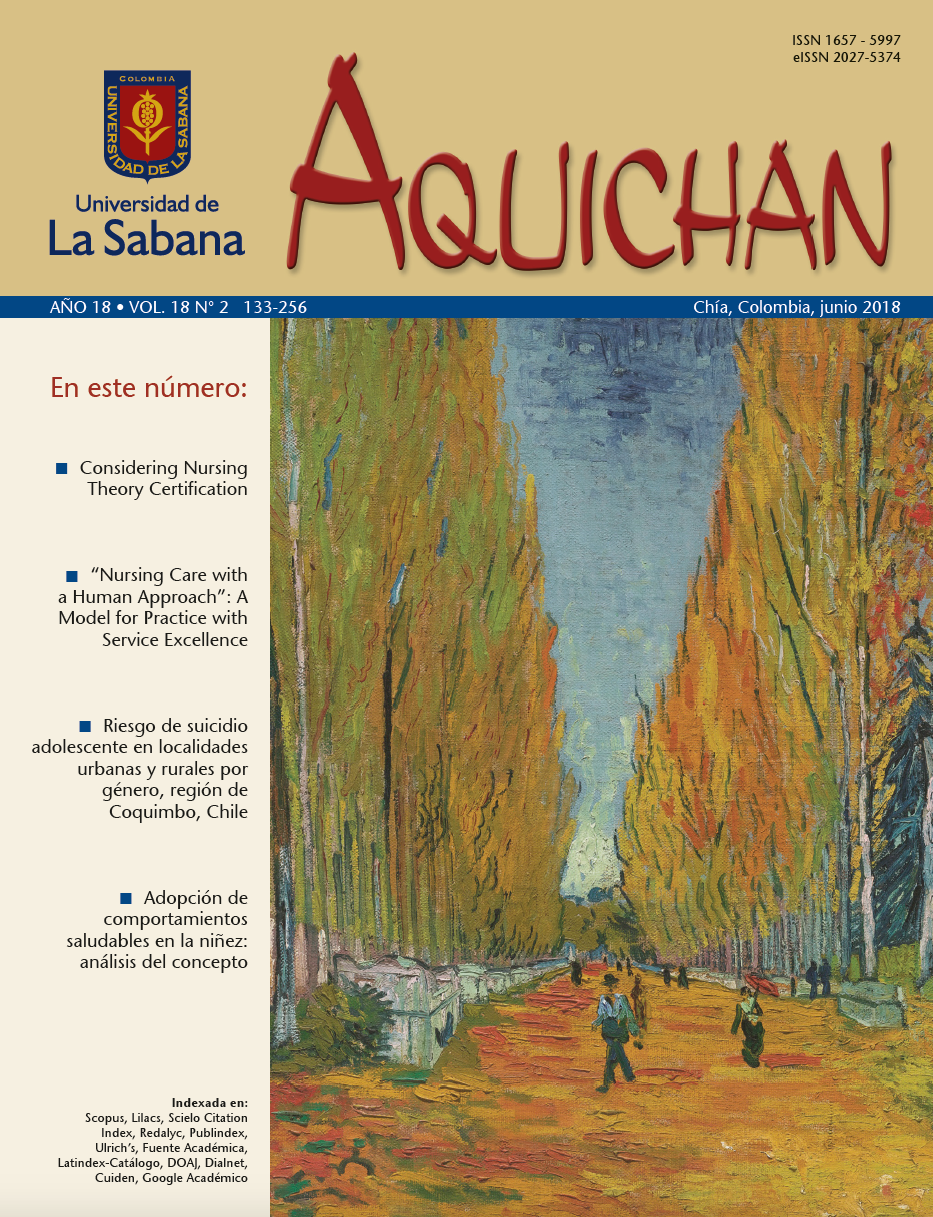Considerando la certificación de la teoría de enfermería
Palabras clave:
Teoría de la enfermería, certificación, modelos de enfermeríaResumen
Objetivo: se realizó un taller para discutir el desarrollo de las certificaciones teóricas de enfermería en cuatro niveles de conocimiento de enfermería como parte de la conferencia anual de 2016 de la Roy Adaptation Association International. Método: se discutieron ocho preguntas en formatos de grupos pequeños y grandes. Los puntos de discusión fueron grabados a mano en un rotafolio. Estos puntos se resumen en este artículo. Resultados: 35 académicos internacionales de enfermería participaron. Discutieron los beneficios, las limitaciones y las estrategias de un nuevo tipo de certificación para el conocimiento de la teoría de enfermería en cuatro niveles de educación y práctica. Conclusión: la certificación de la teoría de enfermería confirmaría el conocimiento de enfermería, sin convertirse en una carga para las enfermeras. Puede afectar potencialmente cómo se educa a las enfermeras sobre la teoría en cada uno de los cuatro niveles de educación, cómo las enfermeras usan la teoría en la práctica, y la calidad de la atención de enfermería brindada. Hay una necesidad de un diálogo continuo al respecto.Descargas
Citas
Global perspective of the Roy Adaptation Model—Countries and cultures. Annual Conference of the Roy Adaptation
Association—International; 2015 June 12-13; Chestnut Hill, MA, USA.
Hanna DR, Buckner EB. Levels of theory knowledge: Implications for education and practice. Workshop conducted at:
Roadmap for the Next 25 Years: Knowledge Based on the Roy Adaptation Model. Annual Conference of the Roy Adaptation
Association—International; 2016 June 10-11; Chestnut Hill, MA, USA.
American Association of Colleges of Nursing. The essentials of baccalaureate education for professional nursing practice.
Washington DC: American Association of Colleges of Nursing; 2008.
American Association of Colleges of Nursing. The essentials of master’s education in nursing. Washington DC: American
Association of Colleges of Nursing; 2011.
American Association of Colleges of Nursing. The essentials of doctoral education for advanced nursing practice.
Washington DC: American Association of Colleges of Nursing; 2006.
American Association of Colleges of Nursing. The research-focused doctoral program in nursing: Pathways to excellence.
Report from the AACN task force on the research-focused doctorate in nursing; 2010. Retrieved from http://www.
aacn.nche.edu/education-resources/PhDPosition.pdf
Smith M, McCarthy MP. Disciplinary knowledge in nursing education: Going beyond the blueprints. Nurs Outlook 2010;
: 44-51. doi: 10.1016/j.outlook.2009.09.002
Grace P, Willis D, Roy C, Jones DA. Profession at the crossroads: A dialog concerning the preparation of nurse scholars
and leaders. Nurs Outlook 2016;64 (1):61-70. https://doi.org/10.1016/j.outlook.2015.10.002
Barrett EAM. Again, What is nursing science? Nurs Sci Quarterly 2017;30(2):129-133. DOI: 10.1177/0894318417693313
Donohue-Porter P, Forbes MO, White JH, Bauman S. Transforming nursing education and the formation of students:
Using the human becoming paradigm. Nurs Sci Quarterly 2017;30(2):134-142. DOI: 1.101177/0894318417693287
American Nurses Credentialing Center. Magnet model: Exemplary professional practice. 2016; Retrieved from http://
www.nursecredentialing.org/Magnet/ProgramOverview/New-Magnet-Model#ExemplaryProfessionalPractice.
ANCC Magnet Recognition Program®. (n.d.). Retrieved June 28, 2017 from http://www.nursecredentialing.org/Magnet
American Association of Colleges of Nursing. Advancing healthcare transformation: A new era for academic nursing.
American Association of Colleges of Nursing: Washington, DC; 2016.
Cody, WK. Nursing theory-guided practice: What it is and what it is not. In Cody, WK (Ed.), Philosophical and theoretical
perspectives for advanced nursing practice (Fifth edition, p. 47-50). Burlington, MA: Jones & Bartlett Learning; 2011.
Descargas
Publicado
Cómo citar
Número
Sección
Licencia
Esta revista y sus artículos se publican bajo la licencia CreativeCommons CC BY 4.0 DEED Atribución 4.0 Internacional, usted es libre de: Compartir — copiar y redistribuir el material en cualquier medio o formato para cualquier propósito, incluso comercialmente. Adaptar — remezclar, transformar y construir a partir del material para cualquier propósito, incluso comercialmente. La licencia no puede revocar estas libertades en tanto usted siga los términos de la licencia.





